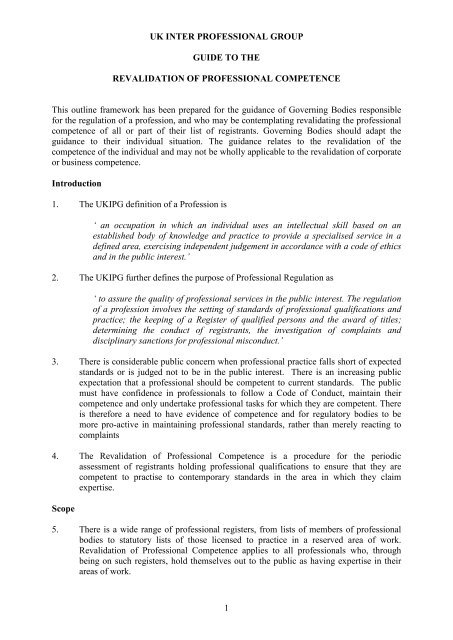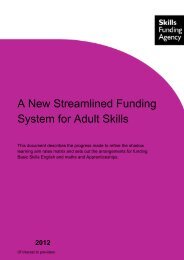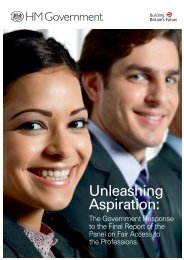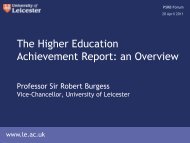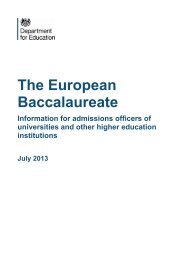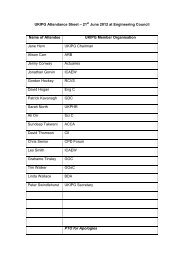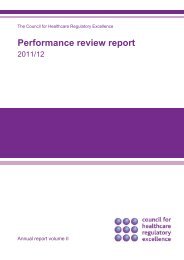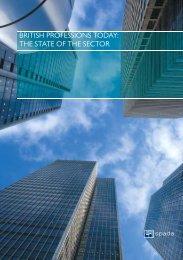Guide to the Revalidation of Professional Competence - ukipg
Guide to the Revalidation of Professional Competence - ukipg
Guide to the Revalidation of Professional Competence - ukipg
Create successful ePaper yourself
Turn your PDF publications into a flip-book with our unique Google optimized e-Paper software.
UK INTER PROFESSIONAL GROUP<br />
GUIDE TO THE<br />
REVALIDATION OF PROFESSIONAL COMPETENCE<br />
This outline framework has been prepared for <strong>the</strong> guidance <strong>of</strong> Governing Bodies responsible<br />
for <strong>the</strong> regulation <strong>of</strong> a pr<strong>of</strong>ession, and who may be contemplating revalidating <strong>the</strong> pr<strong>of</strong>essional<br />
competence <strong>of</strong> all or part <strong>of</strong> <strong>the</strong>ir list <strong>of</strong> registrants. Governing Bodies should adapt <strong>the</strong><br />
guidance <strong>to</strong> <strong>the</strong>ir individual situation. The guidance relates <strong>to</strong> <strong>the</strong> revalidation <strong>of</strong> <strong>the</strong><br />
competence <strong>of</strong> <strong>the</strong> individual and may not be wholly applicable <strong>to</strong> <strong>the</strong> revalidation <strong>of</strong> corporate<br />
or business competence.<br />
Introduction<br />
1. The UKIPG definition <strong>of</strong> a Pr<strong>of</strong>ession is<br />
‘ an occupation in which an individual uses an intellectual skill based on an<br />
established body <strong>of</strong> knowledge and practice <strong>to</strong> provide a specialised service in a<br />
defined area, exercising independent judgement in accordance with a code <strong>of</strong> ethics<br />
and in <strong>the</strong> public interest.’<br />
2. The UKIPG fur<strong>the</strong>r defines <strong>the</strong> purpose <strong>of</strong> Pr<strong>of</strong>essional Regulation as<br />
‘ <strong>to</strong> assure <strong>the</strong> quality <strong>of</strong> pr<strong>of</strong>essional services in <strong>the</strong> public interest. The regulation<br />
<strong>of</strong> a pr<strong>of</strong>ession involves <strong>the</strong> setting <strong>of</strong> standards <strong>of</strong> pr<strong>of</strong>essional qualifications and<br />
practice; <strong>the</strong> keeping <strong>of</strong> a Register <strong>of</strong> qualified persons and <strong>the</strong> award <strong>of</strong> titles;<br />
determining <strong>the</strong> conduct <strong>of</strong> registrants, <strong>the</strong> investigation <strong>of</strong> complaints and<br />
disciplinary sanctions for pr<strong>of</strong>essional misconduct.’<br />
3. There is considerable public concern when pr<strong>of</strong>essional practice falls short <strong>of</strong> expected<br />
standards or is judged not <strong>to</strong> be in <strong>the</strong> public interest. There is an increasing public<br />
expectation that a pr<strong>of</strong>essional should be competent <strong>to</strong> current standards. The public<br />
must have confidence in pr<strong>of</strong>essionals <strong>to</strong> follow a Code <strong>of</strong> Conduct, maintain <strong>the</strong>ir<br />
competence and only undertake pr<strong>of</strong>essional tasks for which <strong>the</strong>y are competent. There<br />
is <strong>the</strong>refore a need <strong>to</strong> have evidence <strong>of</strong> competence and for regula<strong>to</strong>ry bodies <strong>to</strong> be<br />
more pro-active in maintaining pr<strong>of</strong>essional standards, ra<strong>the</strong>r than merely reacting <strong>to</strong><br />
complaints<br />
4. The <strong>Revalidation</strong> <strong>of</strong> Pr<strong>of</strong>essional <strong>Competence</strong> is a procedure for <strong>the</strong> periodic<br />
assessment <strong>of</strong> registrants holding pr<strong>of</strong>essional qualifications <strong>to</strong> ensure that <strong>the</strong>y are<br />
competent <strong>to</strong> practise <strong>to</strong> contemporary standards in <strong>the</strong> area in which <strong>the</strong>y claim<br />
expertise.<br />
Scope<br />
5. There is a wide range <strong>of</strong> pr<strong>of</strong>essional registers, from lists <strong>of</strong> members <strong>of</strong> pr<strong>of</strong>essional<br />
bodies <strong>to</strong> statu<strong>to</strong>ry lists <strong>of</strong> those licensed <strong>to</strong> practice in a reserved area <strong>of</strong> work.<br />
<strong>Revalidation</strong> <strong>of</strong> Pr<strong>of</strong>essional <strong>Competence</strong> applies <strong>to</strong> all pr<strong>of</strong>essionals who, through<br />
being on such registers, hold <strong>the</strong>mselves out <strong>to</strong> <strong>the</strong> public as having expertise in <strong>the</strong>ir<br />
areas <strong>of</strong> work.<br />
1
6. Many areas <strong>of</strong> work are reserved by statute <strong>to</strong> Approved Persons who are generally<br />
required periodically <strong>to</strong> revalidate <strong>the</strong>ir competence. The Government has determined<br />
that it is in <strong>the</strong> public interest for <strong>the</strong> competence <strong>of</strong> health care pr<strong>of</strong>essionals <strong>to</strong> be<br />
revalidated.<br />
7. It is also in <strong>the</strong> public interest for pr<strong>of</strong>essionals engaged in all unreserved areas<br />
involving <strong>the</strong> health, wealth, safety and <strong>the</strong> environment <strong>of</strong> <strong>the</strong> individual <strong>to</strong><br />
demonstrate through a transparent system <strong>of</strong> revalidation that <strong>the</strong>y have voluntarily kept<br />
up <strong>to</strong> date and are competent in <strong>the</strong>ir area <strong>of</strong> expertise. The public are not obliged <strong>to</strong><br />
use such persons for such work nor is <strong>the</strong> work <strong>the</strong>y do restricted <strong>to</strong> <strong>the</strong>m.<br />
8. Many Registers are generic and include pr<strong>of</strong>essionals providing services in a wide<br />
range <strong>of</strong> specialist areas; revalidation may best apply <strong>to</strong> each specialist sub-set. Some<br />
Registers include non-active and retired pr<strong>of</strong>essionals: revalidation would apply only <strong>to</strong><br />
active members who should be clearly indicated on <strong>the</strong> Register and on revalidation<br />
may be shown <strong>to</strong> hold a current practice certificate or licence <strong>to</strong> practice.<br />
Procedures<br />
9. <strong>Revalidation</strong> procedures should be transparent and proportional <strong>to</strong> <strong>the</strong> risk <strong>of</strong> harm that<br />
incompetence <strong>of</strong> <strong>the</strong> pr<strong>of</strong>essional might cause <strong>to</strong> <strong>the</strong> individual. It is not in <strong>the</strong> public<br />
interest for revalidation <strong>to</strong> be on a sample basis: all those registrants whose listing is<br />
subject <strong>to</strong> periodic revalidation <strong>of</strong> competence must be revalidated within <strong>the</strong><br />
prescribed period. A revalidation system needs <strong>to</strong> be as administratively simple as<br />
possible in order <strong>to</strong> ensure that costs are not disproportionate.<br />
10. The revalidation <strong>of</strong> pr<strong>of</strong>essional competence requires pr<strong>of</strong>essionals <strong>to</strong> demonstrate that<br />
<strong>the</strong>y can meet current benchmark standards <strong>of</strong> practice in <strong>the</strong>ir area <strong>of</strong> work. The<br />
revalidation should be based on evidence provided by <strong>the</strong> registrant and assessed by a<br />
third party. A CPD record dependant on accumulating hours or points based on course<br />
attendance, does not meet <strong>the</strong> basic requirements <strong>of</strong> revalidation. A written examination<br />
may not be appropriate.<br />
11. The benchmark standards <strong>of</strong> competence should be set by practising pr<strong>of</strong>essionals in<br />
<strong>the</strong> Governing Body with lay participation as appropriate. The terms in which <strong>the</strong><br />
competence standards are set will vary in each pr<strong>of</strong>ession and each area <strong>of</strong> work. For<br />
many pr<strong>of</strong>essions work has been done on knowledge and competency standards. The<br />
standards should relate <strong>to</strong> current practice.<br />
12. The evidence <strong>to</strong> be provided by <strong>the</strong> registrant might include:-<br />
• Evidence <strong>of</strong> recent and relevant experience<br />
• Evidence that <strong>the</strong>y have kept up <strong>to</strong> date e.g. a record <strong>of</strong> relevant CPD in <strong>the</strong> context<br />
<strong>of</strong> a Personal Development Plan.<br />
• An appraisal <strong>of</strong> competence against <strong>the</strong> benchmark standards.<br />
• Evidence <strong>of</strong> good health and good conduct<br />
13. The appraisal <strong>of</strong> competence may be self assessed, by a pr<strong>of</strong>essional men<strong>to</strong>r or<br />
colleague or as part <strong>of</strong> a performance appraisal by an employer.<br />
2
14. Assessment <strong>of</strong> <strong>the</strong> evidence should preferably be by an independent third party peer<br />
review. It will probably be a consideration <strong>of</strong> a paper submission with <strong>the</strong> option <strong>to</strong> call<br />
for interview or <strong>to</strong> undertake a practice inspection. There is scope for evidence <strong>to</strong> be<br />
computer based, delivered over <strong>the</strong> internet. The assessors might be:<br />
a. A pr<strong>of</strong>essionally qualified administra<strong>to</strong>r <strong>of</strong> <strong>the</strong> Governing Body or<br />
b. A peer registrant appointed by <strong>the</strong> Governing Body or<br />
c. An employer accredited by <strong>the</strong> Governing Body or<br />
d A peer group <strong>of</strong> 2 or 3 with lay representation if appropriate.<br />
Assessors should be trained and those with a large work load paid.<br />
Period <strong>of</strong> <strong>Revalidation</strong><br />
15. The period between revalidations varies from 12 months <strong>to</strong> 5 years. Twelve months<br />
might be appropriate for areas <strong>of</strong> work where pr<strong>of</strong>essional incompetence could lead <strong>to</strong><br />
serious personal injury or death. Twelve months is also <strong>the</strong> normal period for renewal<br />
<strong>of</strong> Registration with <strong>the</strong> payment <strong>of</strong> a subscription; some pr<strong>of</strong>essions also requiring<br />
evidence <strong>of</strong> CPD and PI insurance.<br />
16. Five years seems <strong>to</strong> be a better practice for revalidation <strong>of</strong> pr<strong>of</strong>essional competence, if<br />
only because <strong>of</strong> <strong>the</strong> resources involved in a 100% sample. It is also compatible with <strong>the</strong><br />
European Standard for <strong>the</strong> certification <strong>of</strong> skill (EN45013).<br />
Cost<br />
17. Although revalidation is in <strong>the</strong> public interest, <strong>the</strong> main immediate beneficiary is <strong>the</strong><br />
registrant who is able <strong>to</strong> continue <strong>to</strong> practice in a reserved area <strong>of</strong> work or in an<br />
unreserved area <strong>to</strong> demonstrate current competence in <strong>the</strong> market. The cost should<br />
<strong>the</strong>refore be born by <strong>the</strong> registrant and may be tax deductable. Responsible employers<br />
may reimburse <strong>the</strong> registrant. The cost <strong>of</strong> not moni<strong>to</strong>ring competence could be much<br />
greater and not just <strong>to</strong> <strong>the</strong> registrant.<br />
Sanctions<br />
18. Registrants failing a revalidation assessment should be given <strong>the</strong> opportunity <strong>to</strong> make<br />
good <strong>the</strong>ir deficiency, for example through a period <strong>of</strong> supervised practice or additional<br />
CPD. For a registrant on a Statu<strong>to</strong>ry Register, <strong>the</strong> ultimate sanction is <strong>to</strong> be ‘struck <strong>of</strong>f’.<br />
For a registrant on a non-statu<strong>to</strong>ry register <strong>of</strong> pr<strong>of</strong>essionals in membership <strong>of</strong> a<br />
pr<strong>of</strong>essional body, <strong>the</strong> sanction might be <strong>to</strong> lose <strong>the</strong> annotation in <strong>the</strong> list <strong>of</strong> members<br />
that <strong>the</strong> registrant holds a Practice Certificate or is o<strong>the</strong>rwise certified as <strong>of</strong> current<br />
competence. This may not involve <strong>the</strong> loss <strong>of</strong> a pr<strong>of</strong>essional title. Care must be taken<br />
not <strong>to</strong> mislead <strong>the</strong> public if a non certified member is still able <strong>to</strong> <strong>of</strong>fer pr<strong>of</strong>essional<br />
services.<br />
19. Registrants whose names are removed from a register or whose practice certificate or<br />
licence <strong>to</strong> practice is not renewed must have <strong>the</strong> facility <strong>of</strong> making an Appeal against<br />
<strong>the</strong> decision.<br />
Accreditation<br />
20. A Governing Body might seek <strong>to</strong> add <strong>to</strong> <strong>the</strong> standing <strong>of</strong> its Practice Certificate and<br />
revalidation procedures by having <strong>the</strong> certification procedures accredited <strong>to</strong> European<br />
Standards by <strong>the</strong> UK Accreditation Service (UKAS).<br />
3


